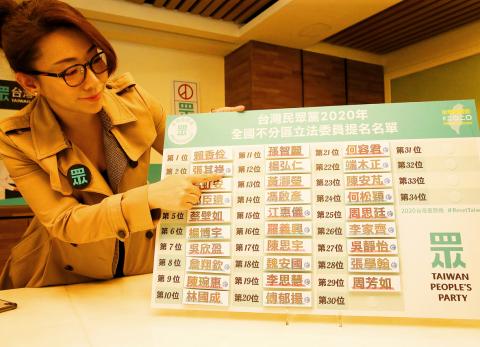The Taiwan People’s Party (TPP) yesterday announced its legislator-at-large nominees for the Jan. 11 elections, with Taipei Department of Labor Commissioner Lai Hsiang-lin (賴香伶) topping the 29-person list.
Taipei Mayor Ko Wen-je (柯文哲), the TPP chairman, said that the average age of the nominees is 41.4 years, which is 25 years younger than that of another party, and that he is proud that many nominees were selected via an open audition.
It was not clear which political party Ko was referring to.

Photo: CNA
“We are recruiting talented people from the public. We do not care if the applying individual is rich or not, and we do not need them to donate NT$80 million [US$2.62 million] to guarantee them a ‘safe’ seat on the list,” he said, adding that the party recruited people based only on their talent and would pay the NT$200,000 registration fee for them.
The public’s wisdom can surpass an individual’s wisdom, so it conducted an open audition to choose at-large nominees for the first time in the nation’s political history, the TPP said.
“We hold the ideal of ‘open government, public participation, openness and transparency,’ and we are unfolding a ‘silent revolution’ stressing the importance of ‘national governance,’” it said.
Other female nominees include Hon Hai Technology Group Industrial Big Data Office vice president Ann Kao (高虹安) at No. 3, Ko’s close aide and Taipei City Government adviser Tsai Pi-ju (蔡壁如) at No. 5, Shin Kong Life Insurance Co deputy general manger Cynthia Wu (吳欣盈) at No. 7, and Taipei City Government deputy spokeswoman Huang Ching-ying, who gained popularity among young people online, at No. 13.
TPP Secretary-General Chang Jer-yang (張哲揚) said 17 nominees were selected through an open audition, and 15 people on the list are under 40.
National Sun Yat-sen University College of Social Science dean Jang Chyi-lu (張其祿), who was selected through an open audition, is No. 2.
When asked why the party nominated only 29 people, despite Ko repeatedly saying that it would nominate a full list of 34 candidates, Chang said there were other nominees, but his aides suggested dropping five of them to save NT$1 million in registration fees.
He was also asked about a rumor that some TPP members were unsatisfied with placing Kao, who is considered Hon Hai Precision Industry founder Terry Gou’s (郭台銘) aide, in a safe seat, as Gou’s aides were rumored to be also in safe seats on the People First Party’s (PFP) nominee list.
Ko said the PFP has not announced its list yet, and Gou had asked whether he wanted to switch the places of Kao with Tsai on the TPP’s list, but he thinks Kao has professional skills in big data and technology, and that having more professionals than politicians would be more beneficial for Taiwan.
Asked about PFP Chairman James Soong’s (宋楚瑜) remark yesterday that he had wanted to cooperate with Ko in the presidential election before Ko founded his own party, Ko confirmed that Soong had talked to him about the idea, but he only “listened and laughed,” because Soong did not give him a detailed proposal.

A magnitude 4.9 earthquake struck off Tainan at 11:47am today, the Central Weather Administration (CWA) said. The hypocenter was 32.3km northeast of Tainan City Hall at a depth of 7.3km, CWA data showed. The intensity of the quake, which gauges the actual effect of a seismic event, measured 4 in Tainan and Chiayi County on Taiwan's seven-tier intensity scale, the data showed. The quake had an intensity of 3 in Chiayi City and County, and Yunlin County, while it was measured as 2 in Kaohsiung, Nantou County, Changhua County, Taitung County and offshore Penghu County, the data showed. There were no immediate reports of

‘DENIAL DEFENSE’: The US would increase its military presence with uncrewed ships, and submarines, while boosting defense in the Indo-Pacific, a Pete Hegseth memo said The US is reorienting its military strategy to focus primarily on deterring a potential Chinese invasion of Taiwan, a memo signed by US Secretary of Defense Pete Hegseth showed. The memo also called on Taiwan to increase its defense spending. The document, known as the “Interim National Defense Strategic Guidance,” was distributed this month and detailed the national defense plans of US President Donald Trump’s administration, an article in the Washington Post said on Saturday. It outlines how the US can prepare for a potential war with China and defend itself from threats in the “near abroad,” including Greenland and the Panama

The Chinese Nationalist Party (KMT) is maintaining close ties with Beijing, the Democratic Progressive Party (DPP) said yesterday, hours after a new round of Chinese military drills in the Taiwan Strait began. Political parties in a democracy have a responsibility to be loyal to the nation and defend its sovereignty, DPP spokesman Justin Wu (吳崢) told a news conference in Taipei. His comments came hours after Beijing announced via Chinese state media that the Chinese People’s Liberation Army’s Eastern Theater Command was holding large-scale drills simulating a multi-pronged attack on Taiwan. Contrary to the KMT’s claims that it is staunchly anti-communist, KMT Deputy

RESPONSE: The government would investigate incidents of Taiwanese entertainers in China promoting CCP propaganda online in contravention of the law, the source said Taiwanese entertainers living in China who are found to have contravened cross-strait regulations or collaborated with the Chinese Communist Party (CCP) could be subject to fines, a source said on Sunday. Several Taiwanese entertainers have posted on the social media platform Sina Weibo saying that Taiwan “must be returned” to China, and sharing news articles from Chinese state media. In response, the Mainland Affairs Council (MAC) has asked the Ministry of Culture to investigate whether the entertainers had contravened any laws, and asked for them to be questioned upon their return to Taiwan, an official familiar with the matter said. To curb repeated